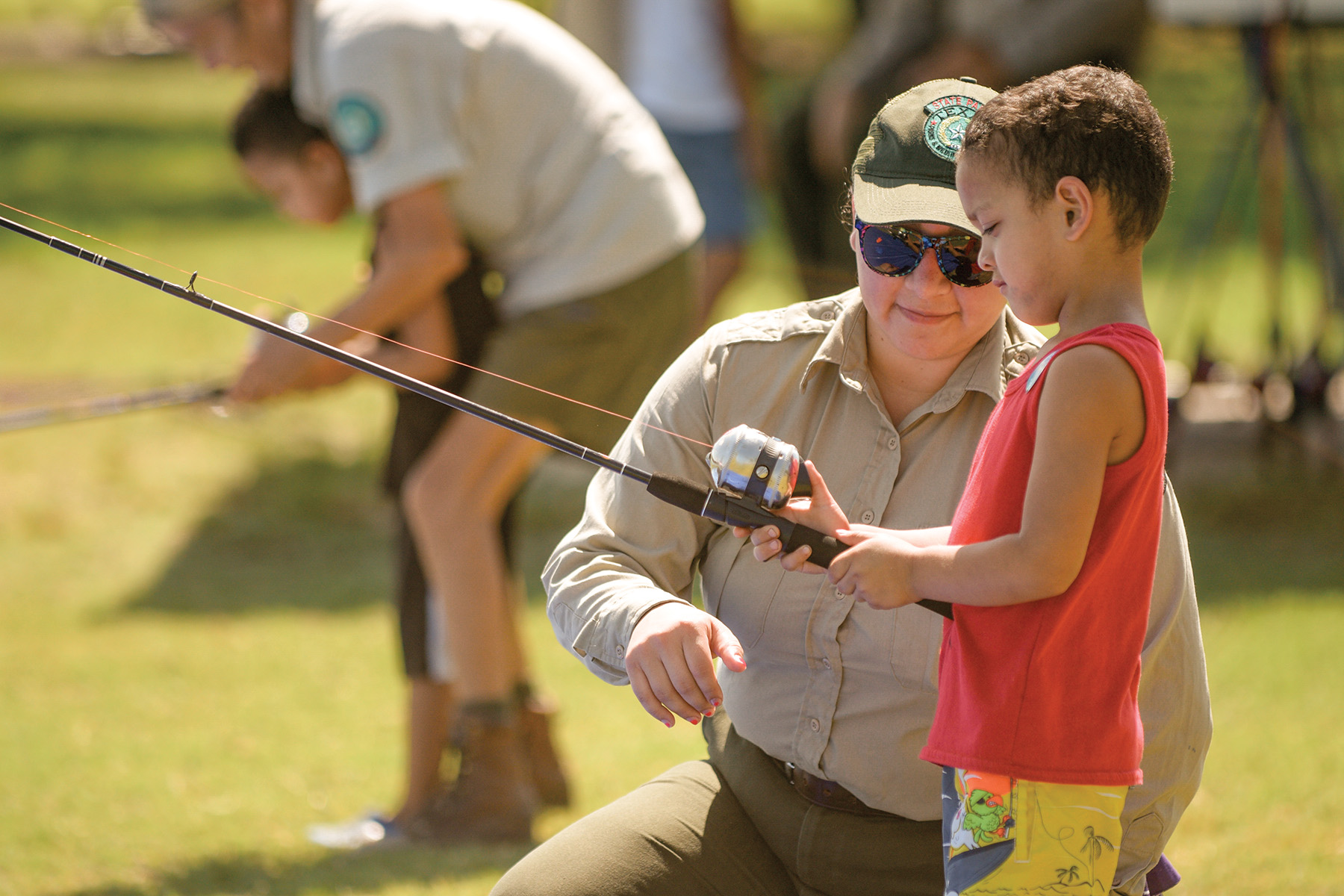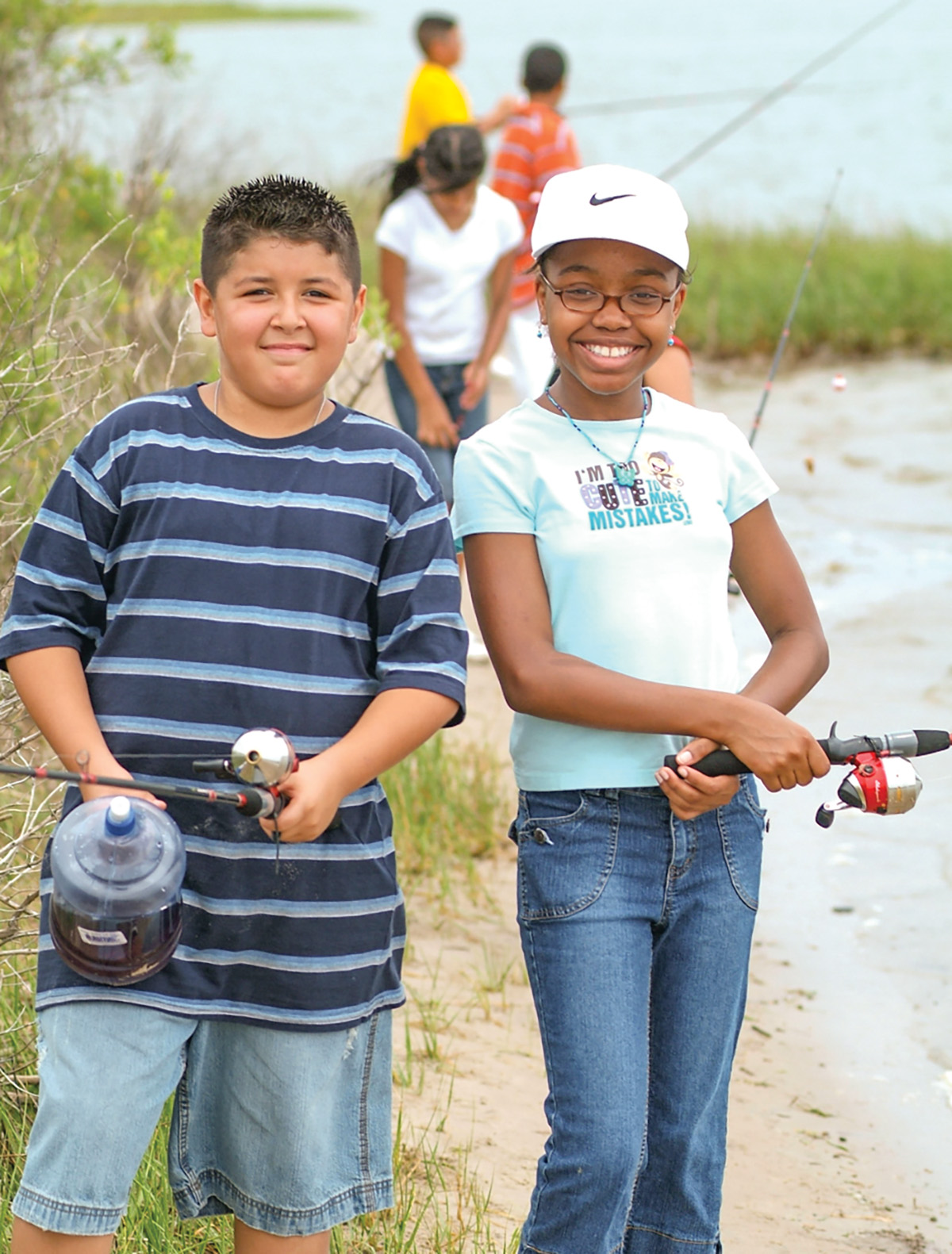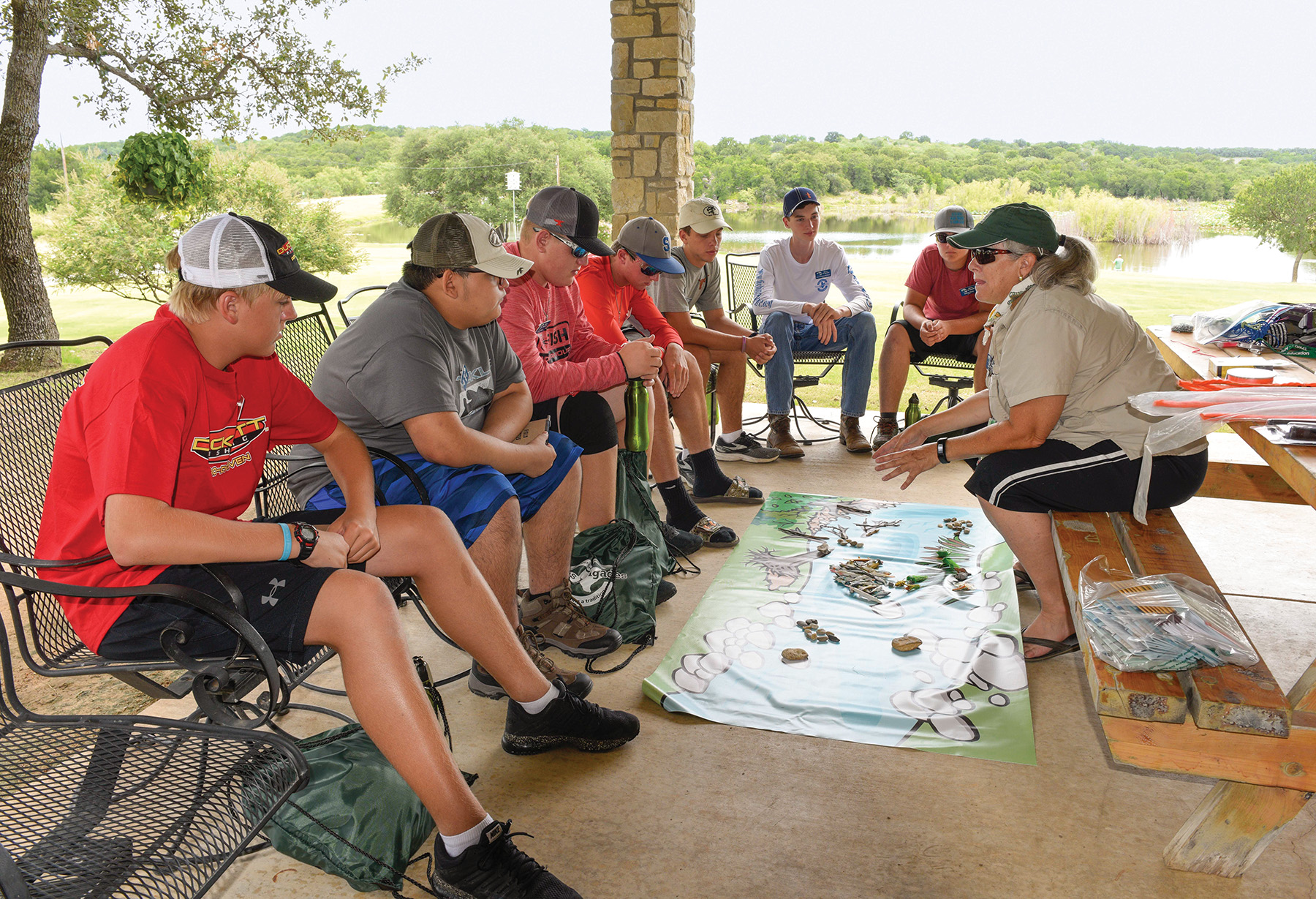
Chase Fountain | TPWD
Fishing ‘school’ turns 30
After three decades, Angler Education keeps Texans wetting their hooks … properly.
Do you remember catching your first fish? Whether you were a young child or a grownup, catching your first fish at any age is memorable and exciting.
Everyone who fishes has a story. The story of Texas Parks and Wildlife Department’s Angler Education Program started 30 years ago. Before we tell that story, though, we should look back at another.
A CIVICS STORY
In 1950, elected officials who were outdoor enthusiasts — U.S. Rep. John Dingell of Michigan and U.S. Sen. Edwin Johnson of Colorado — introduced a bill to fund aquatic habitat and restoration, fish stocking and research. The bill, known as the Dingell-Johnson Sport Fish Restoration Act, passed in 1950.
How it works: Excise taxes on fishing equipment (paid by manufacturers), motorboat and small engine fuel taxes, import duties and interest are collected and appropriated to the states.
In 1984, the Wallop-Breaux Amendment expanded the list of sportfishing gear that qualified for the excise tax and expanded the grant funding to include education programs.
Angler Education comes to Texas
In 1985, a young wildlife biologist, Steve Hall, drove from Colorado to Texas to start a new job at TPWD. Hall officially launched the Angler Education Program in 1992 with funding from that same grant. The program was modeled after TPWD’s successful Hunter Education Program.
Initially, the program was offered at three Texas workshops, with more than 150 people attending each. The classes focused on teaching the basics of fishing.
In 2000, staff created levels of achievement for Angler Education, including Junior and Master Angler, now known as Basic and Advanced. In 2002, fly fishing was added.
Today’s basic Learn to Fish class introduces youth and adults to freshwater or saltwater fishing. Topics include:
•Basic equipment and tackle assembly (spincast rod/reel, hook, sinker and bobber)
• Casting
• Knot-tying
• Fish ID and habitats
• Safety for fish, people and the environment
• Laws, ethics and stewardship.
All classes and instructor training workshops are free and use fun, hands-on activities to teach the basics of fishing and fly fishing. Certified instructors can order free literature and borrow equipment where available.
TPWD relies on a network of volunteer instructors to teach fishing throughout the state. Partners include fishing clubs, individuals, teachers and youth group leaders. You don’t have to be an expert to teach fishing. All you need is the passion to share the joy of fishing with others.
Area chiefs are volunteer train-the-trainers who conduct the free instructor workshops. In June, 35 volunteers assembled in the Hill Country for the 20th annual area chief training. Two trainers who attended the first training in 2002 are still active with the program.
These certified instructors and trainers have many success stories.

Chase Fountain | TPWD
Teachinig kids at Lake Corpus Christi
Fishing with Schools
Every spring for the past 15 years, Hutsell Elementary in Katy brings students and their families, school staff and community partners together for a fishing event. Everyone rotates through various education stations to learn about fishing before heading to the water’s edge to cast their lines. Students can submit their catch for the longest, heaviest or first fish of the day.
The campus-wide program began in the 2006-07 school year with the support of Principal Keiko Davidson. Because it incorporated fish and fishing into all subjects — art, music, PE and science — it was her common practice during interviews to ask prospective teachers how they felt about fishing. (Principal Davidson has since retired, but she continues to support the program and event with current Principal Margie Blount.)
Physical education teacher Mark Fobian started the program in 2002 in another Katy school, Golbow Elementary, with Ruth Turner, Brenda Shaver and Brenda Cooper. Shaver brought it to Hutsell Elementary; the program has now spread to 18 Katy schools.

Courtesy Justin Braswell
Hutsell Elementary's fishing program in Katy
I’m a Junior Angler!
A mother wrote to us about a Junior Angler class she and her daughter attended at Garner State Park.
“My daughter Emilee took the Junior Angler class at Garner State Park,” she wrote. “It was a fantastic experience for her. She’s recently been identified as dyslexic and struggles so hard in school. Her self-esteem is suffering, and she has a hard time being accepted by her peers.”
Being the only girl in the Angler Ed class didn’t faze Emilee.
“The lady who taught the class was amazing in keeping the kids captured and engaged in the class,” her mother wrote. “Before long, Emilee was raising her hand, amongst older boys, and answering questions.”
After class, Emilee caught two fish.
“I can't tell you how happy Emilee was and how much she learned,” her mother wrote. “I’ve been in tears for gratefulness since we left the park. She’s so proud of herself. She told me, ‘My friends in my class can read and spell good, but I’m a certified Junior Angler!’”

Chase Fountain | TPWD
Take Me Fishing event at Galveston Island State Park
Project Healing Waters
Many Angler Ed volunteer instructors work with Project Healing Waters Fly Fishing, a program dedicated to the physical and emotional rehabilitation of disabled active military personnel and veterans through fly fishing education and outings.
Volunteer Area Chief Walter McLendon received a heartfelt note about the program from a participant.
“These classes have been so good for me; they have helped me so much with both my physical and mental well-being,” the participant wrote. “One year ago, I did not even talk to anyone. I would come to the class, sit and not even smile — time to leave, I was gone. You guys kept coming and coming, and now I talk and joke.
“I now feel I have a purpose, and that someone cares. If you only knew where I was at, then you could understand. I will always be grateful for you and the club. Thanks from the depth of my heart.”

TPWD
A gathering of Bass Brigades
COVID-19 CHALLENGE
Teach fishing online? Is that even possible? Like everyone else, our staff and volunteers had to pivot two years ago and cast our lines in a different direction — into the online world.
Talented, creative volunteer instructors came up with a plan. And it worked! The online training workshops use hands-on activities just like the in-person workshops. The workshops have been very successful, so we will continue to offer them, along with online clinics, in addition to in-person classes.
If you haven’t caught your first fish yet, it’s never too late.
If you’re already hooked, join our volunteer network of instructors to teach fishing in your community.
Karen Marks is Aquatic Education manager for TPWD.
Related stories
Angler Curriculum Boosts School's Test Scores
» Like this story? If you enjoy reading articles like this, subscribe to Texas Parks & Wildlife magazine.

